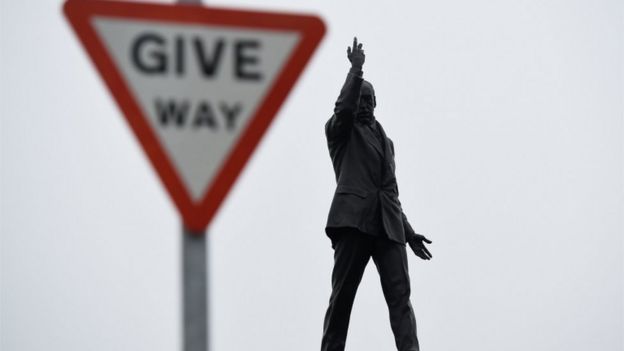«Political partisanship» has prevented meaningful improvements to education during the period of devolution.
That is according to research from Northern Ireland think tank Pivotal.
«Education, Equality and the Economy» by Professor Tony Gallagher of Queen’s University Belfast was launched on Monday.
It said that Northern Ireland’s «fractious» political system has prevented changes in education for the «common good.»
- Northern Ireland training too many teachers
- Education financial challenges ‘significant’
‘Affluent backgrounds’
«Has our education system provided the generation of the ‘ceasefire babies’ with better options and possibilities than the generations which preceded them?» it asked.
«To what extent has devolution and local control of education had an impact on education and educational outcomes?»
Professor Gallagher said that political disagreement had prevented progress on key challenges.
For instance, children from affluent backgrounds in Northern Ireland are much more likely to achieve better qualifications than disadvantaged children.
‘Scandalous circumstance’
In 2017/18, according to the Department of Education, more than half of children (51%) entitled to free school meals achieved 5 GCSEs including English and Maths at grades A*-C.
That compared to almost four in five pupils (79%) who were not entitled to free school meals.
While the gap has closed in recent years, it remains significant.
 Image copyrightREUTERS
Image copyrightREUTERS«It is difficult to understand why this is not perceived more generally as a scandalous circumstance and subject to urgent and immediate interventions,» Professor Gallagher said.
«Pupils entitled to free school meals are much less likely to go into higher education, in comparison with pupils not entitled to free school meals, and this effect is greater for boys than girls.»
Professor Gallagher was also critical of some schools for «gaming» the system to make their exam results look better in unofficial ‘league tables’ published by newspapers.
He claimed that some schools removed «low performing» pupils from their data or prevented some students from moving from AS to A-level year if their performance was not deemed good enough.
According to the Department of Education, almost 7% of year 12 pupils were deemed ineligible for inclusion in GCSE exam results data in 2017/18.
‘Abject failure’
This, Professor Gallagher said, reflected a narrow focus on exam performance rather than the wider values of education.
«What if we were to commit to a goal that, by the time every young person completed their time in education, they would have the qualifications, attributes and attitudes that would allow them to live fulfilled lives as citizens?» he wrote.
«This would involve a recognition that we would not necessarily provide all with the same outcomes, but that all outcomes would be valued.»
On academic selection, Professor Gallagher accused the political parties of «abject failure.»
«The outcome of this debate represents the inability of shared government to find the compromises that might have allowed them to pursue a solution, and an abject failure by them to work cooperatively toward an agreed outcome and the common good,» his paper said.
«The level of inequity in outcomes based on social background remains extreme.»
He further argued that a failure to reform the way schools are funded has led to a «crisis,» especially in primary schools where pupil numbers are rising.
Other reforms – to the number of sectoral bodies in education, for instance – had also been hampered by political parties pursuing their own narrow interests, he said.
«It is hard to escape the conclusion that education could do a lot more to empower young people to believe that a better, shared world is not only possible but achievable,» he concluded.
«We can see so many examples of education policy where political partisanship has got in the way of the common good and a positive response to challenges that have such negative consequences for the whole of society.»
Pivotal is a Northern Ireland think tank independent of government.
Its partners include Queen’s University and Ulster University.
Fuente de la Información: https://www.bbc.com/news/uk-northern-ireland-49880647







 Users Today : 11
Users Today : 11 Total Users : 35460220
Total Users : 35460220 Views Today : 14
Views Today : 14 Total views : 3418909
Total views : 3418909